- Home
- Jack London
The Turtles of Tasman Page 6
The Turtles of Tasman Read online
Page 6
And mebbe you think some of them little droolers weren't glad to see me.
I walked right into the ward. There was a new nurse feeding little Albert. "Hold on," I said. "That ain't the way. Don't you see how he's twisting that left eye? Let me show you." Mebbe she thought I was a new doctor, for she just gave me the spoon, and I guess I filled little Albert up with the most comfortable meal he'd had since I went away. Droolers ain't bad when you understand them. I heard Miss Jones tell Miss Kelsey once that I had an amazing gift in handling droolers.
Some day, mebbe, I'm going to talk with Doctor Dalrymple and get him to give me a declaration that I ain't a feeb. Then I'll get him to make me a real assistant in the drooling ward, with forty dollars a month and my board. And then I'll marry Miss Jones and live right on here. And if she won't have me, I'll marry Miss Kelsey or some other nurse. There's lots of them that want to get married. And I won't care if my wife gets mad and calls me a feeb. What's the good? And I guess when one's learned to put up with droolers a wife won't be much worse.
I didn't tell you about when I ran away. I hadn't no idea of such a thing, and it was Charley and Joe who put me up to it. They're high-grade epilecs, you know. I'd been up to Doctor Wilson's office with a message, and was going back to the drooling ward, when I saw Charley and Joe hiding around the corner of the gymnasium and making motions to me. I went over to them.
"Hello," Joe said. "How's droolers?"
"Fine," I said. "Had any fits lately?"
That made them mad, and I was going on, when Joe said, "We're running away. Come on."
"What for?" I said.
"We're going up over the top of the mountain," Joe said.
"And find a gold mine," said Charley. "We don't have fits any more. We're cured."
"All right," I said. And we sneaked around back of the gymnasium and in among the trees. Mebbe we walked along about ten minutes, when I stopped.
"What's the matter?" said Joe.
"Wait," I said. "I got to go back."
"What for?" said Joe.
And I said, "To get little Albert."
And they said I couldn't, and got mad. But I didn't care. I knew they'd wait. You see, I've been here twenty-five years, and I know the back trails that lead up the mountain, and Charley and Joe didn't know those trails. That's why they wanted me to come.
So I went back and got little Albert. He can't walk, or talk, or do anything except drool, and I had to carry him in my arms. We went on past the last hayfield, which was as far as I'd ever gone. Then the woods and brush got so thick, and me not finding any more trail, we followed the cow-path down to a big creek and crawled through the fence which showed where the Home land stopped.
We climbed up the big hill on the other side of the creek. It was all big trees, and no brush, but it was so steep and slippery with dead leaves we could hardly walk. By and by we came to a real bad place. It was forty feet across, and if you slipped you'd fall a thousand feet, or mebbe a hundred. Anyway, you wouldn't fall-just slide. I went across first, carrying little Albert. Joe came next. But Charley got scared right in the middle and sat down.
"I'm going to have a fit," he said.
"No, you're not," said Joe. "Because if you was you wouldn't 'a' sat down. You take all your fits standing."
"This is a different kind of a fit," said Charley, beginning to cry.
He shook and shook, but just because he wanted to he couldn't scare up the least kind of a fit.
Joe got mad and used awful language. But that didn't help none. So I talked soft and kind to Charley. That's the way to handle feebs. If you get mad, they get worse. I know. I'm that way myself. That's why I was almost the death of Mrs. Bopp. She got mad.
It was getting along in the afternoon, and I knew we had to be on our way, so I said to Joe:
"Here, stop your cussing and hold Albert. I'll go back and get him."
And I did, too; but he was so scared and dizzy he crawled along on hands and knees while I helped him. When I got him across and took Albert back in my arms, I heard somebody laugh and looked down. And there was a man and woman on horseback looking up at us. He had a gun on his saddle, and it was her who was laughing.
"Who in hell's that?" said Joe, getting scared. "Somebody to catch us?"
"Shut up your cussing," I said to him. "That is the man who owns this ranch and writes books."
"How do you do, Mr. Endicott," I said down to him.
"Hello," he said. "What are you doing here?"
"We're running away," I said.
And he said, "Good luck. But be sure and get back before dark."
"But this is a real running away," I said.
And then both he and his wife laughed.
"All right," he said. "Good luck just the same. But watch out the bears and mountain lions don't get you when it gets dark."
Then they rode away laughing, pleasant like; but I wished he hadn't said that about the bears and mountain lions.
After we got around the hill, I found a trail, and we went much faster. Charley didn't have any more signs of fits, and began laughing and talking about gold mines. The trouble was with little Albert. He was almost as big as me. You see, all the time I'd been calling him little Albert, he'd been growing up. He was so heavy I couldn't keep up with Joe and Charley. I was all out of breath. So I told them they'd have to take turns in carrying him, which they said they wouldn't. Then I said I'd leave them and they'd get lost, and the mountain lions and bears would eat them. Charley looked like he was going to have a fit right there, and Joe said, "Give him to me." And after that we carried him in turn.
We kept right on up that mountain. I don't think there was any gold mine, but we might 'a' got to the top and found it, if we hadn't lost the trail, and if it hadn't got dark, and if little Albert hadn't tired us all out carrying him. Lots of feebs are scared of the dark, and Joe said he was going to have a fit right there. Only he didn't. I never saw such an unlucky boy. He never could throw a fit when he wanted to. Some of the feebs can throw fits as quick as a wink.
By and by it got real black, and we were hungry, and we didn't have no fire. You see, they don't let feebs carry matches, and all we could do was just shiver. And we'd never thought about being hungry. You see, feebs always have their food ready for them, and that's why it's better to be a feeb than earning your living in the world.
And worse than everything was the quiet. There was only one thing worse, and it was the noises. There was all kinds of noises every once in a while, with quiet spells in between. I reckon they were rabbits, but they made noises in the brush like wild animals-you know, rustle rustle, thump, bump, crackle crackle, just like that. First Charley got a fit, a real one, and Joe threw a terrible one. I don't mind fits in the Home with everybody around. But out in the woods on a dark night is different. You listen to me, and never go hunting gold mines with epilecs, even if they are high-grade.
I never had such an awful night. When Joe and Charley weren't throwing fits they were making believe, and in the darkness the shivers from the cold which I couldn't see seemed like fits, too. And I shivered so hard I thought I was getting fits myself. And little Albert, with nothing to eat, just drooled and drooled. I never seen him as bad as that before. Why, he twisted that left eye of his until it ought to have dropped out. I couldn't see it, but I could tell from the movements he made. And Joe just lay and cussed and cussed, and Charley cried and wished he was back in the Home.
We didn't die, and next morning we went right back the way we'd come. And little Albert got awful heavy. Doctor Wilson was mad as could be, and said I was the worst feeb in the institution, along with Joe and Charley. But Miss Striker, who was a nurse in the drooling ward then, just put her arms around me and cried, she was that happy I'd got back. I thought right there that mebbe I'd marry her. But only a month afterward she got married to the plumber that came up from the city to fix the gutter-pipes of the new hospital. And little Albert never twisted his eye for two days, it was that tired.
Next
time I run away I'm going right over that mountain. But I ain't going to take epilecs along. They ain't never cured, and when they get scared or excited they throw fits to beat the band. But I'll take little Albert. Somehow I can't get along without him. And anyway, I ain't going to run away. The drooling ward's a better snap than gold mines, and I hear there's a new nurse coming. Besides, little Albert's bigger than I am now, and I could never carry him over a mountain. And he's growing bigger every day. It's astonishing.
THE HOBO AND THE FAIRY
He lay on his back. So heavy was his sleep that the stamp of hoofs and cries of the drivers from the bridge that crossed the creek did not rouse him. Wagon after wagon, loaded high with grapes, passed the bridge on the way up the valley to the winery, and the coming of each wagon was like an explosion of sound and commotion in the lazy quiet of the afternoon.
But the man was undisturbed. His head had slipped from the folded newspaper, and the straggling unkempt hair was matted with the foxtails and burrs of the dry grass on which it lay. He was not a pretty sight. His mouth was open, disclosing a gap in the upper row where several teeth at some time had been knocked out. He breathed stertorously, at times grunting and moaning with the pain of his sleep. Also, he was very restless, tossing his arms about, making jerky, half-convulsive movements, and at times rolling his head from side to side in the burrs. This restlessness seemed occasioned partly by some internal discomfort, and partly by the sun that streamed down on his face and by the flies that buzzed and lighted and crawled upon the nose and cheeks and eyelids. There was no other place for them to crawl, for the rest of the face was covered with matted beard, slightly grizzled, but greatly dirt-stained and weather-discoloured.
The cheek-bones were blotched with the blood congested by the debauch that was evidently being slept off. This, too, accounted for the persistence with which the flies clustered around the mouth, lured by the alcohol-laden exhalations. He was a powerfully built man, thick-necked, broad-shouldered, with sinewy wrists and toil-distorted hands. Yet the distortion was not due to recent toil, nor were the callouses other than ancient that showed under the dirt of the one palm upturned. From time to time this hand clenched tightly and spasmodically into a fist, large, heavy-boned and wicked-looking.
The man lay in the dry grass of a tiny glade that ran down to the tree-fringed bank of the stream. On either side of the glade was a fence, of the old stake-and-rider type, though little of it was to be seen, so thickly was it overgrown by wild blackberry bushes, scrubby oaks and young madrono trees. In the rear, a gate through a low paling fence led to a snug, squat bungalow, built in the California Spanish style and seeming to have been compounded directly from the landscape of which it was so justly a part. Neat and trim and modestly sweet was the bungalow, redolent of comfort and repose, telling with quiet certitude of some one that knew, and that had sought and found.
Through the gate and into the glade came as dainty a little maiden as ever stepped out of an illustration made especially to show how dainty little maidens may be. Eight years she might have been, and, possibly, a trifle more, or less. Her little waist and little black-stockinged calves showed how delicately fragile she was; but the fragility was of mould only. There was no hint of an?mia in the clear, healthy complexion nor in the quick, tripping step. She was a little, delicious blond, with hair spun of gossamer gold and wide blue eyes that were but slightly veiled by the long lashes. Her expression was of sweetness and happiness; it belonged by right to any face that sheltered in the bungalow.
She carried a child's parasol, which she was careful not to tear against the scrubby branches and bramble bushes as she sought for wild poppies along the edge of the fence. They were late poppies, a third generation, which had been unable to resist the call of the warm October sun.
Having gathered along one fence, she turned to cross to the opposite fence. Midway in the glade she came upon the tramp. Her startle was merely a startle. There was no fear in it. She stood and looked long and curiously at the forbidding spectacle, and was about to turn back when the sleeper moved restlessly and rolled his hand among the burrs. She noted the sun on his face, and the buzzing flies; her face grew solicitous, and for a moment she debated with herself. Then she tiptoed to his side, interposed the parasol between him and the sun, and brushed away the flies. After a time, for greater ease, she sat down beside him.
An hour passed, during which she occasionally shifted the parasol from one tired hand to the other. At first the sleeper had been restless, but, shielded from the flies and the sun, his breathing became gentler and his movements ceased. Several times, however, he really frightened her. The first was the worst, coming abruptly and without warning. "Christ! How deep! How deep!" the man murmured from some profound of dream. The parasol was agitated; but the little girl controlled herself and continued her self-appointed ministrations.
Another time it was a gritting of teeth, as of some intolerable agony. So terribly did the teeth crunch and grind together that it seemed they must crash into fragments. A little later he suddenly stiffened out. The hands clenched and the face set with the savage resolution of the dream. The eyelids trembled from the shock of the fantasy, seemed about to open, but did not. Instead, the lips muttered:
"No; by God, no. And once more no. I won't peach." The lips paused, then went on. "You might as well tie me up, warden, and cut me to pieces. That's all you can get outa me-blood. That's all any of you-uns has ever got outa me in this hole."
After this outburst the man slept gently on, while the little girl still held the parasol aloft and looked down with a great wonder at the frowsy, unkempt creature, trying to reconcile it with the little part of life that she knew. To her ears came the cries of men, the stamp of hoofs on the bridge, and the creak and groan of wagons heavy-laden. It was a breathless California Indian summer day. Light fleeces of cloud drifted in the azure sky, but to the west heavy cloud banks threatened with rain. A bee droned lazily by. From farther thickets came the calls of quail, and from the fields the songs of meadow larks. And oblivious to it all slept Ross Shanklin-Ross Shanklin, the tramp and outcast, ex-convict 4379, the bitter and unbreakable one who had defied all keepers and survived all brutalities.
Texas-born, of the old pioneer stock that was always tough and stubborn, he had been unfortunate. At seventeen years of age he had been apprehended for horse-stealing. Also, he had been convicted of stealing seven horses which he had not stolen, and he had been sentenced to fourteen years' imprisonment. This was severe under any circumstances, but with him it had been especially severe, because there had been no prior convictions against him. The sentiment of the people who believed him guilty had been that two years was adequate punishment for the youth, but the county attorney, paid according to the convictions he secured, had made seven charges against him and earned seven fees. Which goes to show that the county attorney valued twelve years of Ross Shanklin's life at less than a few dollars.
Young Ross Shanklin had toiled in hell; he had escaped, more than once; and he had been caught and sent back to toil in other and various hells. He had been triced up and lashed till he fainted, had been revived and lashed again. He had been in the dungeon ninety days at a time. He had experienced the torment of the straightjacket. He knew what the humming bird was. He had been farmed out as a chattel by the state to the contractors. He had been trailed through swamps by blood hounds. Twice he had been shot. For six years on end he had cut a cord and a half of wood each day in a convict lumber camp. Sick or well, he had cut that cord and a half or paid for it under a whip-lash knotted and pickled.
And Ross Shanklin had not sweetened under the treatment. He had sneered, and cursed, and defied. He had seen convicts, after the guards had manhandled them, crippled in body for life, or left to maunder in mind to the end of their days. He had seen convicts, even his own cell-mate, goaded to murder by their keepers, go to the gallows cursing God. He had been in a break in which eleven of his kind were shot down. He had been through a mutiny, w
here, in the prison yard, with gatling guns trained upon them, three hundred convicts had been disciplined with pick-handles wielded by brawny guards.
He had known every infamy of human cruelty, and through it all he had never been broken. He had resented and fought to the last, until, embittered and bestial, the day came when he was discharged. Five dollars were given him in payment for the years of his labour and the flower of his manhood. And he had worked little in the years that followed. Work he hated and despised. He tramped, begged and stole, lied or threatened as the case might warrant, and drank to besottedness whenever he got the chance.
The little girl was looking at him when he awoke. Like a wild animal, all of him was awake the instant he opened his eyes. The first he saw was the parasol, strangely obtruded between him and the sky. He did not start nor move, though his whole body seemed slightly to tense. His eyes followed down the parasol handle to the tight-clutched little fingers, and along the arm to the child's face. Straight and unblinking, he looked into her eyes, and she, returning the look, was chilled and frightened by his glittering eyes, cold and harsh, withal bloodshot, and with no hint in them of the warm humanness she had been accustomed to see and feel in human eyes. They were the true prison eyes-the eyes of a man who had learned to talk little, who had forgotten almost how to talk.
"Hello," he said finally, making no effort to change his position. "What game are you up to?"
His voice was gruff and husky, and at first it had been harsh; but it had softened queerly in a feeble attempt at forgotten kindliness.
"How do you do?" she said. "I'm not playing. The sun was on your face, and mamma says one oughtn't to sleep in the sun."
The sweet clearness of her child's voice was pleasant to him, and he wondered why he had never noticed it in children's voices before. He sat up slowly and stared at her. He felt that he ought to say something, but speech with him was a reluctant thing.
"I hope you slept well," she said gravely.

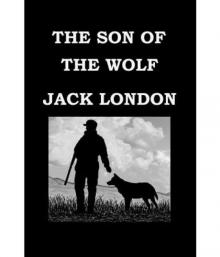 The Son of the Wolf
The Son of the Wolf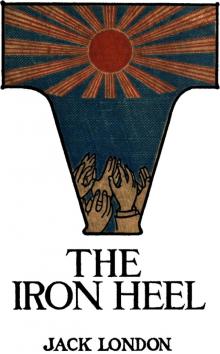 The Iron Heel
The Iron Heel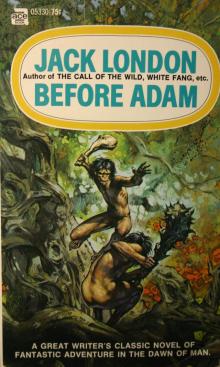 Before Adam
Before Adam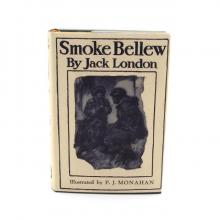 Smoke Bellew
Smoke Bellew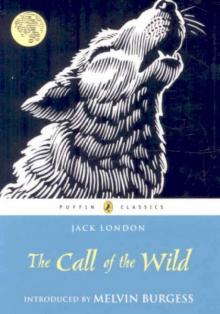 The Call of the Wild
The Call of the Wild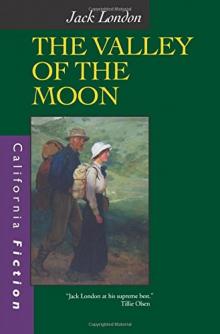 The Valley of the Moon Jack London
The Valley of the Moon Jack London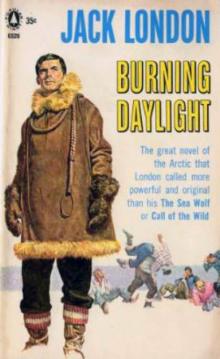 Burning Daylight
Burning Daylight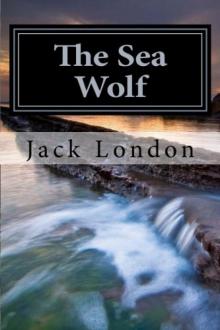 The Sea Wolf
The Sea Wolf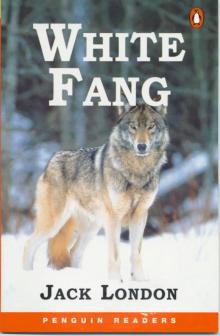 White Fang
White Fang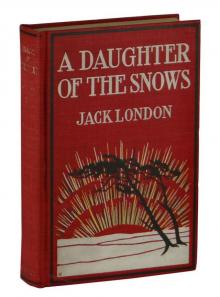 A Daughter of the Snows
A Daughter of the Snows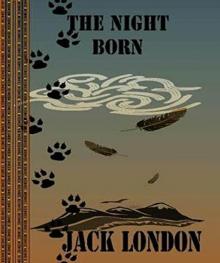 The Night-Born
The Night-Born A Son Of The Sun
A Son Of The Sun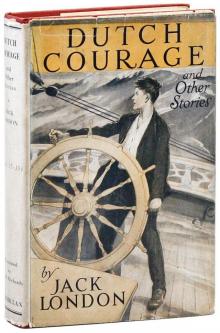 Dutch Courage and Other Stories
Dutch Courage and Other Stories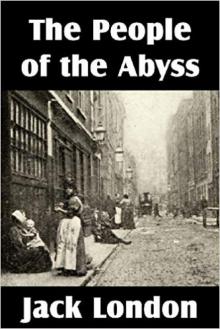 The People of the Abyss
The People of the Abyss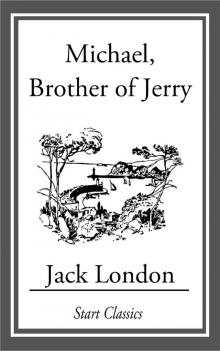 Michael, Brother of Jerry
Michael, Brother of Jerry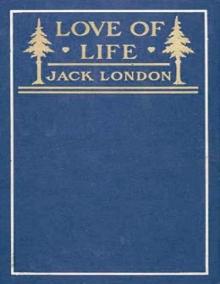 Love of Life, and Other Stories
Love of Life, and Other Stories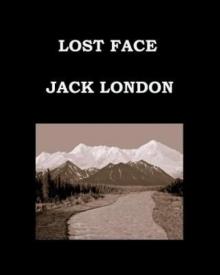 Lost Face
Lost Face The Road
The Road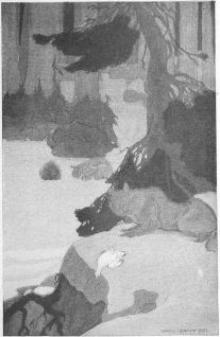 Love of Life
Love of Life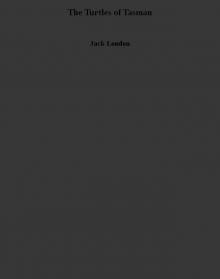 The Turtles of Tasman
The Turtles of Tasman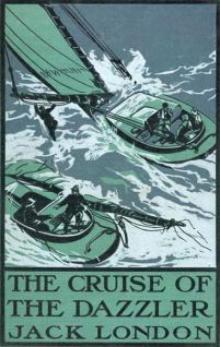 The Cruise of The Dazzler
The Cruise of The Dazzler The Heathen
The Heathen The Scab
The Scab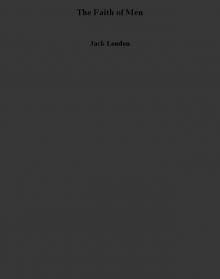 The Faith of Men
The Faith of Men Adventure
Adventure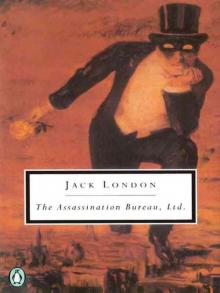 The Assassination Bureau, Ltd.
The Assassination Bureau, Ltd.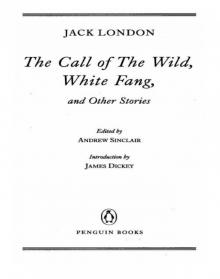 The Call of the Wild, White Fang, and Other Stories
The Call of the Wild, White Fang, and Other Stories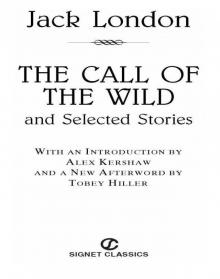 The Call of the Wild and Selected Stories
The Call of the Wild and Selected Stories Jerry of the Islands
Jerry of the Islands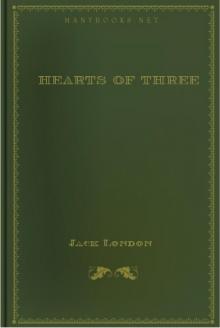 Hearts of Three
Hearts of Three The House of Pride
The House of Pride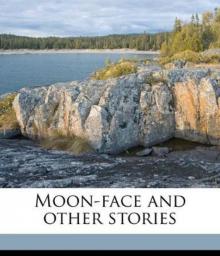 Moon-Face and Other Stories
Moon-Face and Other Stories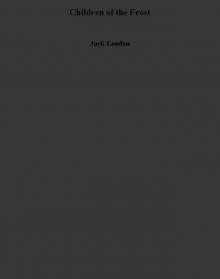 Children of the Frost
Children of the Frost South Sea Tales
South Sea Tales The Strength of the Strong
The Strength of the Strong The Jacket (The Star-Rover)
The Jacket (The Star-Rover) The Little Lady of the Big House
The Little Lady of the Big House John Barleycorn
John Barleycorn ADaugter of Snows
ADaugter of Snows The Mutiny of the Elsinore
The Mutiny of the Elsinore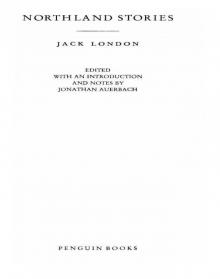 Northland Stories
Northland Stories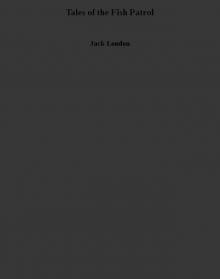 Tales of the Fish Patrol
Tales of the Fish Patrol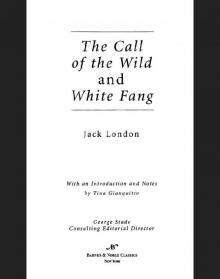 Call of the Wild and White Fang (Barnes & Noble Classics Series)
Call of the Wild and White Fang (Barnes & Noble Classics Series) The Valley of the Moon
The Valley of the Moon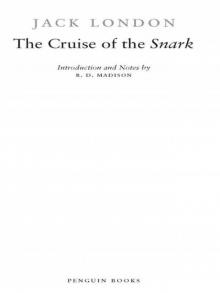 The Cruise of the Snark
The Cruise of the Snark The Game
The Game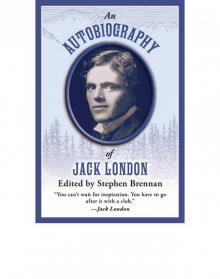 An Autobiography of Jack London
An Autobiography of Jack London